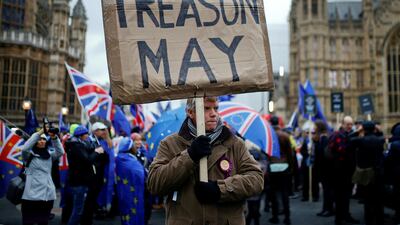Nigel Farage has been a significant player in British politics for years. He is well-known to viewers of Fox News in the US as the man who did the most to lead the vote for Brexit in 2016. But perhaps he should also be known as the man who has done more than most people to destroy Brexit in 2019. The trajectory of his political career also explains how and why populist leaders worldwide often fail to achieve much and why, even in these dark days for Britain's reputation abroad, there are reasons to feel a glimmer of optimism.
Mr Farage has obvious strengths. Many people find him charming, witty and warm. I have enjoyed interviewing him on television, where he displays a shrewd sense of humour. But he also has the classic failings of populists, including his friend, US President Donald Trump. He talks a great deal but cannot actually achieve much. He is a critic of things as they are but does not offer practical solutions to make anything better. And he shows little interest in the hard work necessary to turn TV soundbites into realistic policies.
As the former leader of the UK Independence Party (Ukip), Mr Farage's TV appearances connected with a number of British voters. But after helping bring about the 2016 Brexit referendum, he quit the frontline of British politics to spend time on Mr Trump's presidential campaign trail in the US. Now, with Brexit looking undeliverable and British Prime Minister Theresa May teetering on the brink of abysmal failure, Mr Farage is back trying to corral his hardline faithful as the leader of the newly formed Brexit Party. It is not going well. He attempted to organise a fortnight-long, 200-mile protest March to Leave from Sunderland in the north of England to London, but charged people £50 per head for the privilege. Only about 200 bedraggled protesters turned up and when the thunderous skies let rip and rain poured down, Mr Farage and some of his wealthy backers disappeared, prompting some billboards to read: "Where's Nigel?" Mr Farage talked the talk but did not walk the walk.
Now he is hatching a plan to “save Brexit from betrayal” by “the establishment”. But Mr Farage and many leading Brexiteers are themselves the establishment. He went to a private school, worked in finance in the City of London, counts numerous millionaires among his friends, visits Trump Tower, flies in a private plane and has been a career politician and Member of the European Parliament for 20 years. He is the personification of the establishment.
Even his brilliantly crafted 2016 slogan proclaiming Britain should "take back control" has come to be the ultimate irony. A weakened British prime minister has been forced to beg other European leaders for more time to gain parliamentary approval for her Brexit plans and the EU has begrudgingly agreed. The original departure date of this Friday has ostensibly been revised, but only if Mrs May can get some kind of consensus in the next two days, and it still remains to be seen what options will be on the table when parliament votes on Wednesday.
The prime minister must get her deal through parliament this week for the EU to extend the Brexit deadline to May. If she fails for a third time, she has to return to the EU by mid-April with an alternative plan. She has been holed up all weekend in the prime ministerial residence of Chequers, talking tactics with colleagues, while her own party members plot how to force her to step down.
MPs are angry and dismayed. So are millions of British voters, who have signed a petition to revoke Article 50, which pulled the trigger on Brexit in the first place. More than a million people marched in central London last Saturday, demanding a new referendum. In a febrile political atmosphere, no one appears to be in charge. Mrs May's time as prime minister seems to be coming to an end while Mr Farage increasingly appears to be rallying a diminishing band of enthusiasts to a cause which seems much less appealing than it did in 2016.
And so Britain stumbles into yet another crunch week, with no clear picture of what will get us out of this self-made mess and no sense that anyone is at the helm. Perhaps the shrewdest judgment on Mrs May’s dilemma comes not from Mr Farage but from another right-wing populist, Hungarian Prime Minister Viktor Orban. Last week, Mr Orban told EU leaders at their summit something he said he learned from another British prime minister, Margaret Thatcher. It was this: all Tory leaders only care about one thing – not about Britain or Europe but about their own party. He has a point. Brexit came about because of 40 years of divisions within the Conservative party. Mrs May mistakenly tried to appease the most virulent anti-Europe faction. This group is the closest to Mr Farage and that policy has not worked.
Yet there are reasons to be cheerful. Millions of British people – especially the young – are now engaged in politics as never before. The populist fantasies of Mr Farage have been exposed as impossible. There are rough days ahead but the greatest British political tradition is not populism. It is common sense. Brexit is falling apart because people like Mr Farage and Mrs May cannot make it work. Reasonable, practical people now need to “take back control”.
Gavin Esler is a journalist, author and television presenter


